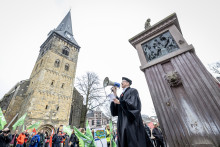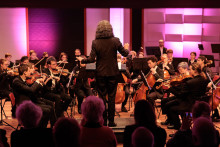Dadi Haryosidharto goes to bed regularly at around 22:00 and wakes up at 6:00. During Ramadan, however, his sleeping schedule was considerably altered. ‘Because I wait until the sun sets to have food, I sleep around midnight,’ he explained. He would wake up again at 2:30, just in time to have one more pre-dawn meal, sleep a few more hours, and start his daily activities later than usual. ‘You could sleep right after work and wake up at 22:00 to break the fasting,’ he added, ‘You can still get 8 hours of sleep, but these are usually fragmented’.

The Master student from Indonesia didn’t complain about such inconvenience. He is proud to have gone through the experience of fasting. ‘You become more self-restrained. You throw your ego out the door and try to be less emotionally impulsive,’ he shared. ‘By the time Ramadan is over, you become a better person. It feels like you’ve taken off your dirty clothes and washed them.’
This was the second year Haryosidharto experienced fasting in a country so far from the equator. ‘In Jakarta, the sunset is at 18:00. But in The Netherlands, days become longer during the summer. It can be 22:00 and the sun is still out there!’ Despite the extended daylight, he reflected on how relatively cool days simplified the practice. ‘In our home countries, fasting feels more intense because the weather is much hotter.’
‘It’s still up to me to do it’
One of the most noticeable differences for Muslims fasting far away from home is that, around here, not everybody follows the practice. ‘In Pakistan, I was quite used to it,’ said Wasim Ahmad who recently joined the UT as a PDEng candidate. ‘The whole society there is doing it. It feels normal.’ Ahmad still enjoys being part of an extensive Muslim community in Enschede, unlike in South Korea, where he studied for his Master degree. ‘The community there was small, though well organized. Here, you have the UT Muslim association, but also a big community of Turkish and Moroccan people. If you visit their mosques, you get to pray in congregation and have dinner’.

Ahmad committed to fasting abroad despite not everyone around him doing it. ‘I see a considerable amount of people that don’t keep the fasting around here, but it’s still up to me to do it’. Like Haryosidharto, Ahmad did not lack the enthusiasm required to bear almost 18 hours without food or water. ‘The main motivation comes from following your faith’, he expressed before suggesting that, on top of the fasting, one could also abstain from bad habits. ‘If during Ramadan you abstain from doing things that aren’t good for you like gossiping or telling lies, then it becomes easier to abstain yourself from those things the rest of the year’.
‘This is like going to the gym’
It can be puzzling for those outside the Muslim world to understand why someone would follow such an arduous practice. ‘People get completely dazzled. They ask “how can you work without coffee, or even drinking water?”,’ said Ramy Rashad, a PhD candidate in the Robotics and Mechatronics department. ‘The simplest answer is we do it because we believe the creator of this universe ordered for us to do it because it's good for us’.

In his second year of fasting outside Egypt, Rashad elaborates on how faith motivates him to willfully submit to the practice. ‘This is like going to the gym. You cannot withstand the heavy weight forever, but you still dot it for a little time. Similarly, we fast for 30 days but not all year. And every day, we have a specific time when we are exempted from fasting. That is like relaxing and contracting a muscle. It’s a training to strengthen our souls, that’s how we think about it’.
Rashad is confident on the benefits of fasting. He even mentioned the 2016 Nobel Prize in medicine was granted to Dr. Yoshinori Ohsumithere for his discoveries of fasting as a self-cleaning mechanism for many diseases. ‘There is a lot of research coming out on how it benefits you. But we didn’t wait until it was proven, we had faith in it. We’ve been fasting for fourteen centuries’.








